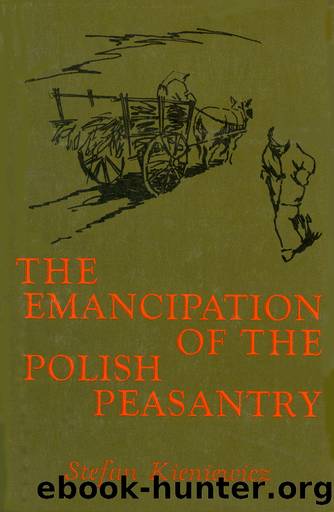Emancipation of the Polish Peasantry by Stefan Kieniewicz

Author:Stefan Kieniewicz [Kieniewicz, Stefan]
Language: eng
Format: epub
Tags: History, General, Europe, Eastern
ISBN: 9780226435268
Google: MX42DgAAQBAJ
Publisher: University of Chicago Press
Published: 2016-06-04T00:26:42+00:00
11
THE CRISIS OF THE FEUDAL SYSTEM IN CONGRESS POLAND
The story of the peasantsâ emancipation in the third province of Poland, the Congress Kingdom, begins with the year 1846. The national insurrection had also been planned against Russia, and in some parts of the territory the democrats made appeals to the peasants, with varying results. Then came the outbreak in Galicia, and thrilling news came across the border of peasants having put an end to their oppression. The landlords were frightened. How would the Russian government react? But Nicholaus I felt too strong to be obliged to woo the peasantsâ support; he thought he could force them to behave. He came to Warsaw, and even to the frontier of the Krakow district, where he addressed a huge peasant crowd, saying, âI am your only benefactor; you may rely on meâbut I shanât support any disorder.â As a matter of fact, he perceived the necessity for some concessions to the rural masses. On his return to Warsaw he asked the opinion of ministerial bureaus and signed a ukase on 7 June 1846 against the advice of Paskevich and other Russian dignitaries. The ukase* was intended to hold back the menace of a peasant uprising by neutralizing some of the most striking abuses by the gentry. At the same time, it did not infringe on the rights of the gentry such as the ownership of land or the functioning of compulsory labor, since an end to these privileges would endanger the feudal regime in Russia proper. The most important provisions of the ukase were the following:
1. Evictions were banned. The landlord was forbidden to drive a peasant from his holding as long as he acquitted himself of his duties. Every holding abandoned for whatever reason was to be assigned to another peasant after at most two years.
2. The peasantsâ prestations were not to be wilfully altered. The administration would record them in order to avoid any ambiguity in the future.
3. In case of conflict with the landlords, the peasants on private estates would have the right to appeal not only to the courts, as before, but also to administrative officials.
4. The government would elaborate a procedure for commuting compulsory labor into rent on private estates.
There was one important flaw in this act. It expressly stated that it exclusively concerned holdings of not less than three morgi (four acres). A large portion of small-holders were thus excluded from its benefits.
As can be seen, the ukase granted the peasants what has been called a stronger right to the soil, modeled, on the whole, on the Austrian Josephinist pattern. It did not confer title of ownership, and it postponed the reform of labor duties to the indeterminate future. Nevertheless, it was the first intervention of the state in the peasantsâ conditions on private estates since the December Decree of 1807, and it was to influence the future evolution of the agrarian problem. An analogous measure was introduced simultaneously in the western guberniyas; that is, the former eastern provinces of the Polish Commonwealth.
Download
This site does not store any files on its server. We only index and link to content provided by other sites. Please contact the content providers to delete copyright contents if any and email us, we'll remove relevant links or contents immediately.
Room 212 by Kate Stewart(5106)
The Crown by Robert Lacey(4808)
Endurance: Shackleton's Incredible Voyage by Alfred Lansing(4772)
The Iron Duke by The Iron Duke(4350)
The Rape of Nanking by Iris Chang(4205)
Joan of Arc by Mary Gordon(4104)
Killing England by Bill O'Reilly(3998)
Say Nothing by Patrick Radden Keefe(3976)
I'll Give You the Sun by Jandy Nelson(3431)
Shadow of Night by Deborah Harkness(3361)
Hitler's Monsters by Eric Kurlander(3331)
Mary, Queen of Scots, and the Murder of Lord Darnley by Alison Weir(3208)
Blood and Sand by Alex Von Tunzelmann(3198)
Eleanor & Park by Rainbow Rowell(3154)
Darkest Hour by Anthony McCarten(3120)
Margaret Thatcher: The Autobiography by Thatcher Margaret(3081)
Book of Life by Deborah Harkness(2935)
Red Famine: Stalin's War on Ukraine by Anne Applebaum(2930)
The One Memory of Flora Banks by Emily Barr(2857)
